Digital desks, in my opinion, have a little
way to go so that all the manufacturers agree
on a common operating system. They each have a
distinct different methodology
this is
annoying. I have been using the Yamaha LS9
recently and have been very disappointed in
various aspects
slow in operation toward a
comparable analogue desk and the plug ins
[compressors, effects] are disappointing for
a reasonably expensive desk [around £4,500].
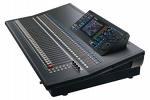 I am not impressed by the
Yamaha LS9 mixing desk
I am not impressed by the
Yamaha LS9 mixing desk
 Plug-in
effects or stand alone rack mounted in your
home studio?
Plug-in
effects or stand alone rack mounted in your
home studio?
Whilst the Protools onboard effects are Okay
I only use the Long Delay programme [you hear it on
nearly every hit track today]
I prefer
outboard effects
I have approx 13 from
memory in my home studio
. My favourites are USA built
because you certainly hear them working
ART
Digitech
Multiverb
then Lexicon [the
Industry standard for reverb]
Roland for its
Roland RSS effects: throws the repeats and
choruses right out past the left/right
speakers
I also have a few Zoom 1201 and
1204
very clean and very reasonably priced.
I go by the sound not by the price. Being a
brand snob gives branditis - a debilitating
disease among music guys that is hard to get
rid of [grin!] I must have been immunised
against this at an early age? Ears tell you
the quality
not price
or brand name.
The on-board effects on the Triton and Motif
can by very nice.
 Self
powered plug-ins in your home studio?
Self
powered plug-ins in your home studio?
There is a type of self powered plug-in system
which has its own CPU and thus operates
independently of the computer. UAD are
probably the best for these
I have looked at
them and am personally not convinced that
there is a benefit in using them.
http://www.uaudio.com
The
UAD series are reasonably priced but I have
seen others with huge price tags ... I prefer to
have the real thing!
 The UAD plug-in hardware - with
it's own CPU - plugs into the Tower.
The UAD plug-in hardware - with
it's own CPU - plugs into the Tower.
 Compressors
in your home studio?
Compressors
in your home studio?
Compressors are the unsung heroes of hit
recording
not understood by amateurs and
novices but the successful guys know
compressors inside out
. My essential
compressor for lead vocals is the TLA Audio
Fatman 11
stereo valve compressor used by all
the top Hip Hop guys
.
 The incredible
Fatman
The incredible
Fatman
You certainly hear it
working
then DBX, Drawmer [these tend to be
very transparent and not easily heard]
Behringer have raised their game and now have
a huge reputation though their 'Composer'
standard in touring shows. I
use a few '4 in 1' units
. Four compressors in
one rack unit. My favourite is LA Audio 4C
. Behringer make a Multicom ... theory is good
but I have been let down by one in a touring
situation ... once bitten twice shy?
Again, I am not impressed by the compressor
plug-ins although I have used Bomb Factory
in the Protools set up
. Yes, you can hear it
working but I much prefer the outboard sound.
 A
dedicated drum sound module in your home
studio?
A
dedicated drum sound module in your home
studio?
I would consider a stand alone drum module
very quick, easy and handy to use
I have
used the Alesis D4 very successfully for years and now
use the Alesis DM5 as my main drum sound
module
I always use drum samples, as well, to
layer the sounds and get a perfect for the
track, new, drum sound
then I sample that and
keep it safe for re-use. Thus, my drum sounds
are evolving with each project.
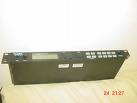
Alesis DM5 drum sound module
 What
monitors in your home studio?
What
monitors in your home studio?
Monitors are the most important part of a
studio set-up. All the great equipment is no
good unless you hear it properly
After sound proofing and insulating your home
studio ensure that it is as dead sounding as
possible
see
http://www.makehits.co.uk/art019.htm
for this advice.
The only monitors to use in your home studio are the ancient
Yamaha NS10S
. Industry standard throughout
the world, easily identified by their cute
white cones and essential for mixing hit
records
despite what the amateurs and
novices say
and that is why you see them in
every major studio
it is a constant,
accurate,
reference point right through the world. Hard
to find but worth the search.
I recommend the Studiosound look-alikes SN10 to
all Members of the
Serious Writers Guild and
have never had a complaint .. at £97? A silly
price.
 Studiospares SN10
Studiospares SN10 |
 Yamaha NS10 - spot the difference?
Yamaha NS10 - spot the difference? |
Personally I use the NS10s for all the
listening work, and mixing
whilst checking
the mixes on a pair of high quality domestic
Hi Fi speakers [KEF Corelli and higher powered
KEF Carina 11]
this gives me an accurate
indication of how a domestic listener would
hear the tracks. These kick out just under 100
DB SPL. You could consider Bang & Olufsen .. pricy but very tasty.
Genelec
have a good reputation ... as do Alesis, KRK.
For main, full powered, studio speakers I use
custom built Nightfire speakers
20Hz to
20KHz
137DB SPL [Sound Pressure Level]
extremely loud
only used to finally check a
mix or to check a suspected frequency mishap
in the mix. There are many main monitor
speakers ... research them. Starting with
Altec.
Of course, it is essential to drive them with
the biggest power amp you can afford [with no
cooling fan]
I use an ancient Quad 303 for
the NS10S
now can you find one of them? I
also use a 1,000 watt Yamaha [with no fan
keeps the inherent noise down]
Some
monitors are self powered ... making for a very
efficient system.
 What
microphones in your home studio?
What
microphones in your home studio?
Microphones are the easiest to choose
you
need one good condenser mic. for vocals
.
Neumann are Industry Standard but have a
prohibitive price tag. I
use the Shure KSM27 mostly
a superb all
round microphone that has featured on many of
my huge selling tracks
the Shure SM58 is
industry standard for vocals
and the SM57
for instrument and drum miking.
I am
in a lucky position where I get given a
lot of new microphones to test and recommend
... quite frankly it is hard to tell the
difference between any of them except for solo
voice or choir recording.
N.B. The law in
California states that any item that touches
the mouth cannot be returned to a shop ...
that makes testing microphones in studios
impossible?
|

Shure
KSM27 |
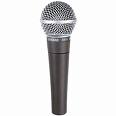
Shure
SM58 |

Shure
SM57 with the only
guitar
equipment to use |
 What
earphones in your home studio?
What
earphones in your home studio?
The last requirement for a good home studio,
to ensure a professional standard, is earphones.
Essential, when recording, as you will most likely not
have a live recording space separate to the control
room.
The Industry standard, just like NS10S, is
Beyer Dynamic DT100
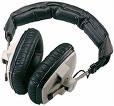 used in every major
studio in the world and in TV and Radio. They
are modular built so any part can be replaced
if broken or damaged. Very high SPL and
comfortable to use
with padding to isolate
the sound from microphones etc. when tracking
[playing or singing with a track to record].
used in every major
studio in the world and in TV and Radio. They
are modular built so any part can be replaced
if broken or damaged. Very high SPL and
comfortable to use
with padding to isolate
the sound from microphones etc. when tracking
[playing or singing with a track to record].
I use these for recording
through a
Behringer Powerplay Pro which can deliver
sound for up to 8 sets of earphones. Again, a
product which Behringer have got right.
For general Midi music writing to computer and overall listening
[after my self imposed 10pm cut-off] I use Sennheiser lightweight earphones
excellent
quality but slightly lacking in SPL
this is a
benefit as it makes me keep the level down
from blood dripping from the ears
which
can cause long term ear damage. The softness
of the earpieces is excellent for lengthy
sessions.
Sennheiser HD400 and HD414
classic earphones
with soft, soft foam
http://www.sennheiser.co.uk
Beyer Dynamic DT150 have an extended bass
frequency range
but I have never found that
necessary for studio work.
You will notice I do not dwell on Pre-Amps
mainly because I have never found the
necessity to use them
I consider the
pre-amps on the Digidesign 003 to be fine
I
never compress or limit when recording [only
on mix down]
I intend to trial a few on my
next major project
but until then
my
thought is that they may be important for
Andrea Bocelli or Celine Dion but not for the
crash bang wallop music that tends to make the
money
and that is what I do
make the
money.
 So what else do I need to get started in your
home studio?
So what else do I need to get started in your
home studio?
A good pop shield in front
of the microphone - many are available
and quite cheap. Check out
www.Studiospares.com
The incredible Red 100 from
StudioSpares in the UK is a sensational microphone
reflection filter that sits behind the microphone
and stops any unwanted echoes and reflections from
entering the back of the microphone. Stunning.
 And finally in your
home studio?
And finally in your
home studio?
The CD recorder?
Which make? I have never
been convinced that one is better than the other ...
I still use my very first recorder .. a Phillips ...
must be twelve years old. And then, I bought
it second hand as they were horrendously expensive
when they first came on the market ... and no one
really knew whether the format would become Industry
Standard.
Just a word of warning ...
never believe the argument that MP3, or, worse
still, Mini Disc, is as good as 41.4Hz CD ... it
simply is not!
So .....
Best of
luck with your next project ... with the gear
above there is no excuse ... oh, except that you
have to know what a hit record is and how to
write it and produce it .... where do you learn
that?
The Serious Writers Guild ... membership
simply by purchasing "How
To Make A $Million From Your Music"
By the
way, never master your own material ... bring it
to the best Mastering Suite you can afford.
a home studio can produce stunning top quality
results but the Mastering Suite is where the
'fairy dust' is liberally sprinkled.
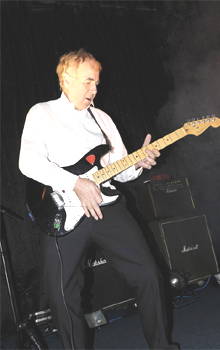 Regards from Dec
Regards from Dec
| The
idea for this article on home studios was from songwriting
and music making members
of The Serious Writers Guild. It
gives an idea of the benefits of
belonging to the Guild. You can
join simply by purchasing the ten month
programme 'How to Make A $Million From
Your Music' at www.makehits.co.uk/swgappsecure.htm |